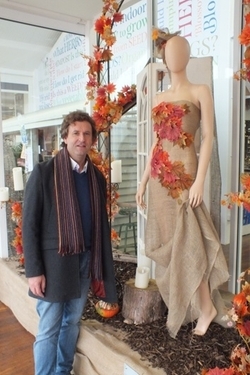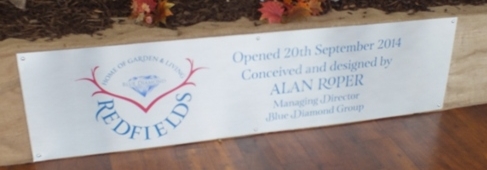 Alan Roper, the boss of the Blue Diamond Group, claims that the trick to a successful garden centre is to put the ownership in the hands of the teams in the stores.
Alan Roper, the boss of the Blue Diamond Group, claims that the trick to a successful garden centre is to put the ownership in the hands of the teams in the stores.
The Blue Diamond Group has increased its portfolio of garden centres to 16 with the acquisition of Trelawney Wadebridge and delivered a transformation of Redfields Garden Centre.
"You have to get the staff to own the space," Alan told GTN Xtra this week. "You have to empower them and give them the tools to do the job, so you can grow the business without slippage or weaknesses because you’ve suddenly got 30 businesses to get round instead of 15.
"For me, every time I build a garden centre they are different shapes, different sizes, and also you’re buying a lot of different buildings, some from 1970’s, 80’ glasshouses so you can’t really have a one size fits all, but every time you have an opportunity to build a new business it’s nice, like here [at Redfields], to keep pushing the boundaries, to keep trying to do something a bit different and keep moving it forward.
"But the true trick is the creativity that you want the people in the stores to deliver. The trick is that you have to put ownership in the hands of the teams in the centres.
"You do it by getting them empowered. Highlighting missed opportunities and potential opportunities via our benchmarking tool so that they can see where they can get the growth from based on someone doing a good job in a planteria somewhere else. They can drill in, they can see the pictures and they can share information. It’s that free spirit and that competitive behaviour that gets ownership of the space.
"For example the team at Le Friquet sent out an e-mail about wanting to be the No 1 in the group for Christmas, and now they’ve gone to No1 by some margin. They are really going for it." (Eds note: The Greatest Christmas Awards team are on their way to visit!)
"As a result they are getting creative, it becomes infectious. You can’t do that top down. I can set the framework, I can say we're going to have a point of difference, I’m going to be a little bit outside the box, a bit maverick about how we approach it. I can define our retail standards and our retail ethos and I can create the church but the trick is to get the staff to understand it, sign up to it and the give them the space. Give them their head to take ownership and be proud of what they are achieving and drive it.
"If you try to do a top down approach they become over corporate and you end up with spaces that look the same.
When asked how far this model can be scaled Alan told us about the journey he is on: "Roughly I’m doing three businesses, new ones, every two years and at the moment I’ve got a strategy in place, with a pre-agreed gearing limit that we won’t exceed and we’ll keep funding developments and acquisitions out of cash flow. At that rate we’ll be at £200 million in 10 years.
"When I joined 15 years ago we were at £6.7 million, now next year we will be £80 million and we’ll keep growing. It’s a pace which we can manage without damaging our existing business but still deliver this quality with new businesses. But you can’t do it without giving the teams in the centres the space and the freedom to create within the disciplines you craft. That’s the key thing.
Alan has clear views on the role of group management; "if the figures aren’t broken leave it alone, you don’t need to, let them do it. If I come in have questions about merchandising I’ll talk to Adam, provided there’s a good reason for it fine. As long as the standards are being maintained, as long as were suddenly not piling it high, selling it cheap and putting fluorescent signs up, provided it’s within the framework leave them alone.
"I’ve got the lightest operational team of any group this size, and we’re the third largest now. I want people to go in and support the teams, I don’t want people dictating and for me that’s the only way that we can grow as a group and feel like a collection of independents, expressing that character and passion that independents do but in a group scenario.
On the number of independents being swallowed up by the groups, Alan's view is that ultimately the independents will get stronger. "The industry is going to homogenise, which means that independents will have a strong future because they will stand out more from the everyday one strategy fits all [of the corporate’s]. It will actually strengthen a lot of independents. The market will shrink in the number of businesses, it will get smaller, there will be less independents but the ones that remain will be stronger for it both in terms of their identity.
"Good independents will be seen to be more credible and the footfall will steer back to them and I do believe if you are in an ABC1 demographic that there will be a re-birth of the smaller retail nursery, probably with a nice little café, not very big, good coffee, good plants, good information.
The future strategy of the Blue Diamond growth will be a mix of leasehold and freehold acquisitions. "Leasing gives a good return on capital employed and it enables us to expand at a greater rate then if you were just buying freeholds, but the balance of our portfolio always has to be 50% leasehold, 50% freehold.
"I’ve just done the Trelawney deal which is a lease and we’ve just put a bid in on a centre in the south which would be a freehold deal.

See below for a photographic tour of Redfields now that Phase 2 is fully open and then watch out for the December issue of Garden Trade News when we will publish Alan's unique guided tour of Redfields.
